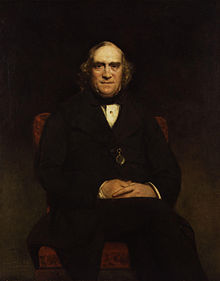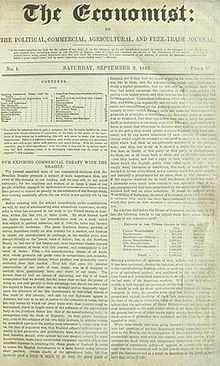The Economist
The Economist [ði: ɪˈkɒnəmɪst] is an international weekly newspaper, published in magazine format in print and digital, focusing on current news, international business, politics and technology. Based in London, the newspaper is owned by The Economist Group and has central editorial offices in the United States and major cities in continental Europe, Asia and the Middle East. In August 2015, the Pearson media group sold its 50% stake in the newspaper to the investment arm of Italy's Agnelli business family for £469 million (€541 million) and the newspaper acquired the remaining shares for £182 million (€209 million). In 2020, global print and digital circulation topped 1.7 million. On social media platforms, the newspaper reached an audience of 35 million in 2016.
The Economist was founded in 1843 by Scottish economist James Wilson to rally support for the abolition of Britain's Corn Laws. Over time, the newspaper's coverage expanded to include political economy and eventually began publishing articles on current events, finance, trade, and British politics. During the 20th century, the layout and format expanded considerably, adding opinion columns, special reports, political cartoons, letters to the editor, cover stories, art criticism, book reviews, and technological developments. The newspaper is recognizable by its fire engine red logo and striking covers. Articles are written anonymously and without line breaks.
The Economist's editorial stance is based on classical liberalism and sees itself in the tradition of Adam Smith, John Stuart Mill, John Locke, David Hume and William Ewart Gladstone. The newspaper supports socially liberal causes such as the recognition of same-sex marriage and the legalization of drugs. The Economist also advocates economic liberalism, particularly free markets, free trade, free immigration, deregulation, and globalization. The newspaper's use of witty wit, puns, and other rhetorical stylistic devices, as well as its high quality reporting, have connected it with a high-income and well-educated readership. In this sense, the magazine claims to have an influential audience of prominent business leaders and policy makers.
History
The Economist was founded in 1843 by James Wilson and first appeared on September 2 of that year. The newspaper was launched to support the campaign to repeal the Corn Laws and protectionist grain laws and to promote free trade. The title of the publication reflected this political orientation, the term Economism at the time, denoted economic liberalism. Although the Corn Laws were abolished in 1846, the journal remained in existence and true to Wilson's liberal ideas.
Wilson described The Economist's mission as participating in "a fierce contest between the intelligence that presses forward and an unworthy, timid ignorance that impedes our progress," a phrase that still appears as a mission on the paper's masthead. Even then, The Economist was considered one of the most competent and intelligent of Western journals. Karl Marx believed that the newspaper best embodied the interests of the bourgeoisie. In 1915, Vladimir Ilyich Lenin called The Economist the magazine that spoke most intelligently for British millionaires.
In 1920, the magazine's circulation rose to 6,170. In 1934, it underwent its first major redesign. The current red logo was created by Reynolds Stone in 1959. In 1971, The Economist changed its broadsheet format to a perfectly bound magazine-style format. In January 2012, the magazine launched a new weekly section devoted exclusively to China, the first section devoted to new countries since the introduction of a section on the United States in 1942.
As of March 23, 2006, John Micklethwait was editor-in-chief. He moved to Bloomberg News at the beginning of 2015. He was succeeded at the Economist by Zanny Minton Beddoes on 2 February 2015.
In 2005, the Chicago Tribune named The Economist the best English-language newspaper. Its strengths lie in its international reporting.
In 2006, Italian Prime Minister Silvio Berlusconi called the magazine 'ecommunist' after being harshly criticised in the paper on several occasions.
In 2012, The Economist allegedly hacked into the computer of Bangladesh Supreme Court Judge Mohammed Nizamul Huq. In the process, the newspaper exposed serious wrongdoing, leading to his resignation as chairman of the International Crimes Tribunal.
In 2013, a writer for Forbes Magazine accused economists writing anonymously of an egalitarian view, and a one-sided grasping for positions that mean economic growth, without simplistically stating that it is only a mathematical quantity. The contrarian view, for instance to increase domestic population would come up short, with all sorts of missed economic opportunities as well.
In August 2015, media group Pearson sold its 50% stake in the newspaper to the investment arm of Italy's Agnelli family of entrepreneurs for £469m (€541m), and the newspaper acquired the remaining shares for £182m (€209m).
The Economist is bought in most countries around the world, but especially in North America (54%), the UK (19%) and continental Europe (15%), including Germany and France (2% each).
On September 15, 2018, Issue No. 9109 was published as the 175th Anniversary Issue.

Scottish economist and founder of The Economist James Wilson

The front page of the Economist, September 2, 1843.
Editorial stance
The Economist's editorial stance is based on classical liberalism. The newspaper sees itself as a proponent of a liberalism inspired by Adam Smith, John Stuart Mill, John Locke, David Hume and William Ewart Gladstone, and opposes any unjustified restriction of individual liberties, whether economic or personal. Since its inception, the newspaper has supported radical centrism and favored centrist politics. The Economist advocates economic liberalism, particularly free markets, free trade, free immigration, deregulation, and globalization.
The Economist supports socially liberal causes, such as recognition of same-sex marriage. In addition, the U.S. tax system has been criticized as unfair, and the newspaper argues for government regulation such as a ban on smoking in public places, or a worldwide ban on corporal punishment for children, as well as strict laws on gun ownership. The Economist consistently advocates government migration aid and free school choice by parents through education vouchers. The newspaper also once published an obituary for God. The Economist has advocated for drug legalization since 1989, calling legalization the "least bad solution." A February 2016 article praised global progress towards cannabis legalization.
The Economist supports action against climate change. Climate change is to be combated by efficient and effective instruments such as a CO2 price and emissions trading. In 1997, the newspaper wrote that the United States was showing "dangerous signs" of using the developing world as an excuse to do nothing about global warming. In 1998, The Economist argued that global warming was a disaster that required big money to reduce fossil fuels. In an editorial before the UN climate conference in Copenhagen in 2009, The Economist said that the risk of catastrophic climate change and its impact on the economy far outweigh the economic costs of tackling climate change. The newspaper supports the Paris Agreement and advocates a tightening of global climate targets.
The Economist supported Britain's accession to the EuropeanEconomic Community and membership of the European Union. It particularly emphasizes the great economic benefits of the common internal market. However, the EU bureaucracy is criticized for its inefficiency. In the 2016 UK EU membership referendum, The Economist came out in favour of the Remain campaign. The newspaper opposes a no-deal Brexit and calls for a second referendum.
The paper argues for subsidy reduction and opposes price controls. It also advocates global free trade agreements. However, governments should help workers who lose their jobs as a result of the resulting efficiency gains in the economy.
The Economist has repeatedly come out in favour of the CDU and Angela Merkel in the federal election. However, it is critical of coalitions with the SPD and favours coalitions with the FDP and the Greens instead. In the UK House of Commons elections, The Economist has supported the Labour Party (2005), the Conservative Party (2010 and 2015), and the Liberal Democrats (2017 and 2019). In the United States presidential election, the newspaper has supported both Republican and Democratic candidates. It came out in favour of Barack Obama, Hillary Clinton and Joe Biden.
The Ecomonist endorses the economic reforms of Margaret Thatcher and Ronald Reagan. The newspaper argues that Thatcher's transformation of the British economy towards free markets, privatisation and deregulation was very positive and backs this up with macroeconomic figures.
In 2008, The Economist noted that Cristina Fernández de Kirchner, then president of Argentina, was destroying any hope for change and leading her country into economic peril and social conflict. The Economist called for the impeachment of Bill Clinton. After the Abu Ghuraib torture scandal came to light, the newspaper called for the resignation of Donald Rumsfeld. The Economist supported the Iraq war but was unhappy about its strategic execution.
In a 175th anniversary editorial, The Economist criticized supporters of liberalism for protecting the political status quo rather than implementing reform. The newspaper urged liberals to recommit to bold political, economic, and social reforms: Protection of free markets, land and tax reforms in the Georgist tradition, open immigration, rethinking the social contract with greater emphasis on education, and a revival of liberal internationalism.

The Scottish economist Adam Smith represents basic beliefs of the newspaper regarding liberalism and free trade.
Search within the encyclopedia